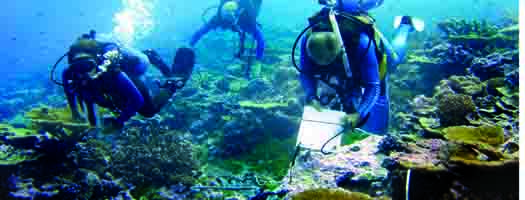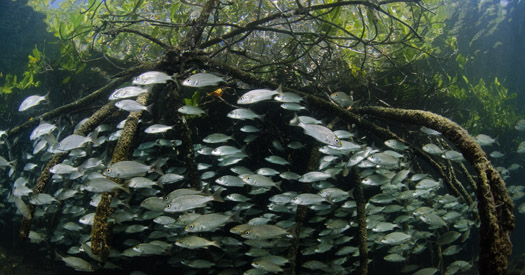
Scripps Oceanography’s Center for Marine Biodiversity and Conservation Toasts 10 Years
Center celebrates anniversary and looks forward to the decades ahead
By:
- Mario Aguilera
Published Date
By:
- Mario Aguilera
Share This:
Article Content
Event Details
WHAT:
Scripps' Center for Marine Biodiversity and Conservation (CMBC) celebrates its 10-year anniversary and looks forward to the decades ahead with two special events (both events are free but reservations are required).
SCHEDULE:
Thursday, Jan. 26, 2012, 6:30 p.m., Birch Aquarium at Scripps
Nancy Knowlton, founding director of CMBC, will present a special lecture entitled "Beyond the Obituaries: Success Stories in Ocean Conservation" and book signing for "Citizens of the Sea," a celebration of the decade-long Census of Marine Life program (books will be available for purchase).
RSVP to 858-534-5771 or online.
Friday, Jan. 27, 2012, 9 a.m. to 5 p.m., Robert Paine Scripps Forum for Science, Society and the Environment (Scripps Seaside Forum) on the Scripps Oceanography campus (8610 Kennel Way, La Jolla, CA 92037).
A full day of speakers is slated to highlight the past, present and future of the center during "CMBC: The Next Decade Symposium." The event includes presentations by:
- Knowlton, founding director of CMBC
- Lisa Levin, current CMBC director
- And a special lecture by former Scripps scientist and previous CMBC director Jeremy Jackson, a world-renowned marine ecologist.
For details and to RSVP online: http://cmbc.eventbrite.com
One decade ago Scripps Institution of Oceanography at UC San Diego embarked on a new quest. As the institution approached the celebration of its 100th anniversary, a new center was launched to push science at Scripps in a new direction as the institution prepared to dive into its second century of discovery.
When the Center for Marine Biodiversity and Conservation (CMBC) was launched in May 2001, marine ecologist Nancy Knowlton envisioned a center that would not only forge new ground in scientific discovery, but contribute to solutions relevant for the environment and society. To address rising threats such as pollution, overfishing and climate change, the center would stay rooted in biological and ecological sciences, but also forge new links with faculty and students in the social sciences, such as economics.

CMBC research has included surveys of Kingman Reef in the Central Pacific Ocean.
"I've spent my entire career studying biodiversity on the one hand and watching the health of marine ecosystems decline on the other. By the time I got to Scripps in 1998, I was really inspired to do something to bring these two themes together," said Knowlton, now the Sant Chair of Marine Science at the Smithsonian National Museum of Natural History. "Scripps was the perfect place to do this because it had-and has-such strength in both of these areas. More than anything, CMBC has provided the glue that makes the whole greater than the sum of its parts."
Today, as CMBC celebrates its 10th anniversary, the center that Knowlton envisioned has exceeded expectations. From the coast of California to Baja California to uninhabited islands in the Central Pacific Ocean, CMBC scientists are making discoveries important not only for science but for the global community. CMBC-trained students continue to forge ahead with new science and contribute to marine conservation from positions in state and federal government and non-governmental organizations.
CMBC research focusing on Pacific Ocean atolls has been cited in policy documents that established the Pacific Remote Islands Marine National Monument and two other monuments in 2009. These monuments are among the largest marine protected areas on the planet. CMBC scientists were instrumental in 2011 legislation to ban the sale, trade and possession of shark fins in California. And research published in 2011 based on a decade of surveys in the Gulf of California has proven that marine protected areas and underwater parks can revitalize once-depleted marine habitats.

CMBC researchers study mangroves in the Gulf of California.
"The original CMBC vision of integrating natural sciences and social sciences to promote sustainability and find solutions to the ocean's pressing problems is alive and more relevant than ever," said Lisa Levin, a Scripps professor of biological oceanography and CMBC's current director. "CMBC's participants from Scripps, UC San Diego and NOAA's Southwest Fisheries Science Center represent an awesome intellectual resource. The students, researchers and faculty bring passion, creativity and tremendous knowledge to the task of sustaining a healthy ocean. A real challenge is to match the intellectual capital and new technological advances with financial and logistical resources."
Looking to the future, Levin says the next decade will see CMBC striving to engage a large share of the region's intellect, involve more members of the business and conservation communities, promote ocean literacy and stewardship principles and increase the center's international reach.
Levin, whose research involves deep-sea exploration, says conservation of the marine environment is more important now than ever.
"In unexplored, pristine environments such as those found in parts of the deep sea, the values of most species remain undiscovered and their recovery from disturbance may be exceedingly slow or impossible," said Levin. "Habitat protection, whether in shallow or deep water, is a critical element of ocean stewardship. As the famous oceanographer Ben Franklin said: 'An ounce of prevention is worth a pound of cure.'"
Share This:
You May Also Like
Stay in the Know
Keep up with all the latest from UC San Diego. Subscribe to the newsletter today.


